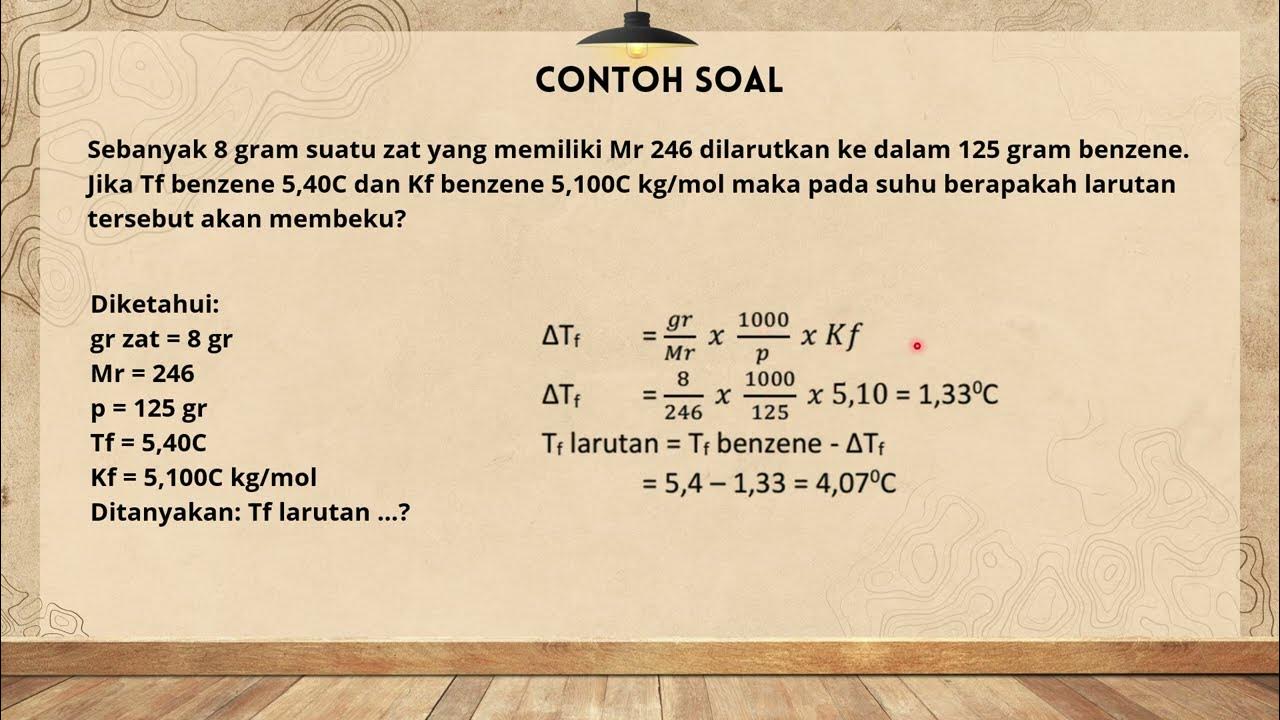Make a freezing mixture by adding salt to water | Water | Physics
Summary
TLDRThe video script explains the crucial role of salt in ice cream production. Salt lowers the freezing point of water, enabling ice to reach temperatures below zero Celsius for faster, more uniform cooling. This process results in a creamier ice cream texture. An experiment demonstrates that ice melts slower in saltwater due to the lower temperature slowing the melting rate. Historically and currently, ice cream is preserved in insulated containers with salt and ice mixtures to maintain its frozen state throughout the day.
Takeaways
- 🧂 Salt is crucial in ice cream making due to its ability to lower the freezing point of water.
- ❄️ The reduced freezing point allows ice to reach temperatures below zero degrees Celsius, facilitating faster and more consistent cooling.
- 🍨 This process results in a smoother and creamier texture for the ice cream.
- 🔍 The melting rate of ice is slower in saltwater due to the lower temperature of the mixture.
- 🧪 A simple experiment can demonstrate this by comparing the melting of ice cubes in saltwater versus pure water.
- 🕒 The experiment shows that the ice cube in saltwater melts less, proving the slow melting effect.
- 🏔 Historically, before refrigeration, salt was used with ice to keep ice cream frozen.
- 🚚 Even today, salt and ice mixtures are used in insulated vessels for distributing ice cream, ensuring it stays frozen.
- 🌡️ The mixture's lower temperature slows the melting process, preserving the ice cream's quality.
- 🌍 This method is particularly useful in areas without advanced refrigeration systems, maintaining the ice cream's frozen state throughout the day.
Q & A
Why is salt used in the making of ice cream?
-Salt is used in the making of ice cream because it lowers the freezing point of water, allowing the ice to reach temperatures below zero degrees Celsius. This facilitates more rapid and uniform cooling.
How does salt affect the freezing point of water?
-Salt reduces the freezing point of water, which means that a mixture of ice and salt can remain below the normal freezing point of pure water, thus slowing down the melting process.
What is the effect of salt on the melting rate of ice?
-When ice is kept in a saltwater solution, it melts more slowly due to the lower temperature of the mixture, which slows down the rate of melting.
Can you explain the activity mentioned in the script with salt, water, and ice cubes?
-The activity involves adding salt to one glass of water and placing an ice cube in each of two glasses, one with saltwater and one with pure water. After waiting for some time, the ice cube in the saltwater will have melted less, demonstrating the effect of salt on the melting rate.
Why does the ice cube in saltwater melt less than in pure water?
-The ice cube in saltwater melts less because the presence of salt lowers the freezing point, causing the ice to remain solid at a lower temperature than it would in pure water.
What is the significance of the observation that ice melts slowly in saltwater?
-The observation that ice melts slowly in saltwater is significant because it demonstrates the principle behind the use of salt in ice cream making and in preserving frozen goods without modern refrigeration.
How was ice cream distributed before the invention of refrigeration?
-Before the invention of refrigeration, ice cream was distributed in insulated vessels containing a mixture of salt and ice, which kept the ice cream frozen for an extended period.
Why are salt and ice still used today for distributing ice cream in some areas?
-Salt and ice are still used in some areas for distributing ice cream because the mixture provides a simple and effective way to maintain low temperatures without the need for electrical refrigeration.
What is the term for the process where salt lowers the freezing point of water?
-The process where salt lowers the freezing point of water is known as freezing point depression.
Can the principle of salt and ice be applied to other food preservation methods?
-Yes, the principle of using salt to lower the freezing point of water can be applied to other food preservation methods, such as in the creation of brine solutions for pickling.
Outlines

Esta sección está disponible solo para usuarios con suscripción. Por favor, mejora tu plan para acceder a esta parte.
Mejorar ahoraMindmap

Esta sección está disponible solo para usuarios con suscripción. Por favor, mejora tu plan para acceder a esta parte.
Mejorar ahoraKeywords

Esta sección está disponible solo para usuarios con suscripción. Por favor, mejora tu plan para acceder a esta parte.
Mejorar ahoraHighlights

Esta sección está disponible solo para usuarios con suscripción. Por favor, mejora tu plan para acceder a esta parte.
Mejorar ahoraTranscripts

Esta sección está disponible solo para usuarios con suscripción. Por favor, mejora tu plan para acceder a esta parte.
Mejorar ahoraVer Más Videos Relacionados

what's the point of SALT in making Ice Cream

Receta 1: Helado antes de que hubiera neveras con Fernando Sáenz Premio Nacional de Gastronomía 2016

Kepoin Pabrik Es Krim Kemasan | SI UNYIL (23/03/20)

Ice Cream Sandwiches | How It's Made

Tugas Kewirausahaan | Presentasi Laporan Pertanggungjawaban Kegiatan Usaha "R&J Ice Cream"

Sifat koligatif 4 Penurunan titik beku
5.0 / 5 (0 votes)
